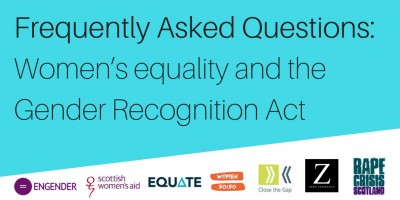Engender blog
Frequently asked questions: Women’s equality and the Gender Recognition Act

Engender, along with Scottish Women's Aid, Rape Crisis Scotland, Zero Tolerance, Equate Scotland, Close the Gap and the Women 5050 Campaign, have produced a document with frequently asked questions about women's equality and the Gender Recognition Act.
What is the Gender Recognition Act?
The Gender Recognition Act 2004 (GRA) is the law that governs how trans people can get their gender identity legally recognised – and so have the correct gender marked on their birth certificate. The GRA is currently UK-wide legislation, but birth certificates are a devolved matter that the Scottish Parliament can legislate for.
Under the Gender Recognition Act 2004, it is possible to apply to a Gender Recognition Panel and obtain a full Gender Recognition Certificate. A person with a full Gender Recognition Certificate is recognised legally as having acquired a new gender, and their birth certificate is amended to reflect this. The process has been criticised as being too lengthy, complex, and intrusive. It also does not allow for recognition of non-binary people, or anyone under 18.
In November 2017, the Scottish Government launched a review of the Gender Recognition Act which includes proposals such as:
- Replacing requirements to provide medical evidence and to live in an acquired gender for two years when seeking legal gender recognition, with a self-declaration system
- Reducing the age at which recognition can be obtained to 16, and considering options for under-16s
- Options for the legal recognition of non-binary people – people who do not identify as male or female
The UK Government is also conducting a review of the Gender Recognition Act through a separate process.
Statement in support of the Equal Recognition Campaign and reform of the Gender Recognition Act
As national gender equality organisations and campaigns, Close the Gap, Engender, Equate Scotland, Rape Crisis Scotland, Scottish Women’s Aid, Women 50:50 and Zero Tolerance support the realisation of rights of trans people.
Downloads
 Engender Briefing: Pension Credit Entitlement Changes
From 15 May 2019, new changes will be introduced which will require couples where one partner has reached state pension age and one has not (‘mixed age couples’) to claim universal credit (UC) instead of Pension Credit.
Engender Briefing: Pension Credit Entitlement Changes
From 15 May 2019, new changes will be introduced which will require couples where one partner has reached state pension age and one has not (‘mixed age couples’) to claim universal credit (UC) instead of Pension Credit.
 Engender Parliamentary Briefing: Condemnation of Misogyny, Racism, Harassment and Sexism
Engender welcomes this Scottish Parliament Debate on Condemnation of Misogyny, Racism, Harassment and Sexism and the opportunity to raise awareness of the ways in which women in Scotland’s inequality contributes to gender-based violence.
Engender Parliamentary Briefing: Condemnation of Misogyny, Racism, Harassment and Sexism
Engender welcomes this Scottish Parliament Debate on Condemnation of Misogyny, Racism, Harassment and Sexism and the opportunity to raise awareness of the ways in which women in Scotland’s inequality contributes to gender-based violence.
 Gender Matters in Social Security: Individual Payments of Universal Credit
A paper calling on the Scottish Government to automatically split payments of Universal Credit between couples, once this power is devolved to the Scottish Parliament.
Gender Matters in Social Security: Individual Payments of Universal Credit
A paper calling on the Scottish Government to automatically split payments of Universal Credit between couples, once this power is devolved to the Scottish Parliament.
 Gender Matters Manifesto: Twenty for 2016
This manifesto sets out measures that, with political will, can be taken over the next parliamentary term in pursuit of these goals.
Gender Matters Manifesto: Twenty for 2016
This manifesto sets out measures that, with political will, can be taken over the next parliamentary term in pursuit of these goals.
 Scottish NGO Briefing for UN Special Rapporteur on Violence Against Women
Joint briefing paper for the UN Rapporteur on Violence Against Women.
Scottish NGO Briefing for UN Special Rapporteur on Violence Against Women
Joint briefing paper for the UN Rapporteur on Violence Against Women.

Newsletter
Sign up to receive our newsletter here:
Sign up to our mailing list
Receive key feminist updates direct to your inbox: